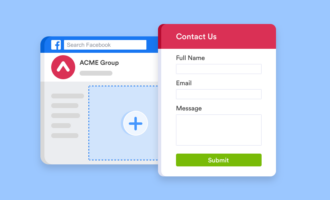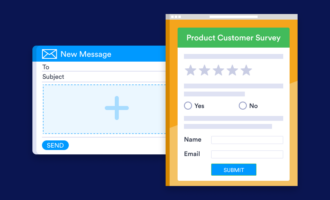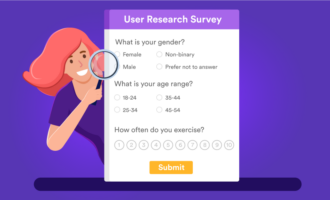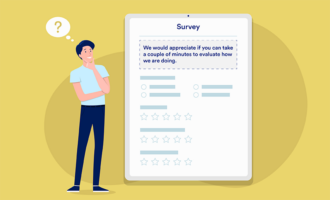According to the latest census, there’s now a 61 percent chance that two people chosen at random in the U.S. will be from different racial or ethnic groups.
Does your business understand the various cultural backgrounds and preferences of your customers? If not, you could be missing out on opportunities to connect with them through your marketing efforts or product offerings.
To find out more about the ethnicity of the customers you serve, why not try incorporating some ethnicity survey questions into your annual market research surveys? Ethnicity survey questions focus on the ancestral background and culture of your respondents, and they can give you great insights into the wants and needs of your core customers.
In this article, we look more closely at ethnicity survey questions, including the benefits of gathering this type of information. We also cover some best practices for creating effective ethnicity survey questions and share some examples. Plus, we go over how you can create your own survey with Jotform.
The difference between race, ethnicity, and nationality
People sometimes use the terms race, ethnicity, and nationality interchangeably. While they’re related terms that overlap in some ways, it’s important to recognize their differences so you can use them accurately when communicating with your target audience.
Race is typically defined by one’s physical characteristics, such as their skin color or hair type. However, race is considered a social construct, and it’s important to note that there’s a lot of variation in racial characteristics within one race “category.” For example, people within the same racial group may look completely different from one another.
Ethnicity is often conflated with race, but it’s a different type of social construct. Ethnicity typically refers to the shared culture of a group of people, which can include language, nationality, geographic region, history, and more. People who are of the same race can have different ethnicities, and people who are of the same ethnicity can be of different races.
Nationality specifically refers to the country a person is from. It has no bearing on race or ethnicity, as people can share the same nationality but be of different races and ethnicities.
Benefits of asking ethnicity questions
Many organizations want to know the ethnicity of their target audience because this information can help them make strategic decisions.
For example, people who are of a certain ethnicity may have a preference for certain types of products, price points, language(s), and more. Understanding what appeals to them and what motivates them can help your business better cater to their needs.
The advantages of using ethnicity survey questions include
- A deeper understanding of the target audience: Ethnicity survey questions may reveal that previously held assumptions are false. For example, the majority of your customers may, in fact, turn out to be of a different ethnicity than what you expected, which could shed new light on their perceptions of your brand.
- Opportunities for self-identification: Because ethnicity is complex, using a survey allows the target audience to tell you how they choose to identify. They may use a different term for their ethnicity than your organization thought to use, for example.
- Increased diversity in the workplace: Many businesses want their workforce to reflect the diversity of their consumer base. Ethnicity survey questions can help you get to know your target audience better to help you identify possible blindspots in your hiring practices.
- More effective business strategies: From pricing to marketing campaigns to product lines, information about your target audience’s ethnicity can help your organization better meet their needs — and increase your profits at the same time.
Best practices for creating ethnicity surveys
To ensure your ethnicity survey is successful, follow these tips:
- Understand the sensitive nature of the topic: Bear in mind that not all people are comfortable answering questions about their ethnicity. Make the questions optional so respondents can decide how much and what type of information they’ll provide. Race and ethnicity are sensitive topics because these socially constructed categories have been used to segregate and discriminate against certain groups of people.
- Identify a clear goal: Don’t ask for your target audience’s ethnicity just for the sake of knowing it. Only ask for this information if it aligns with a specific goal you’re trying to achieve with the survey.
- Use the right language: Learn the difference between race, nationality, and ethnicity, and be sure to use the right terminology in the survey. If you’re not sure what potential ethnicities your audience will identify as, give them the option to self-identify with an open-ended question.
- Don’t generalize: Don’t assume that people who share the same ethnicity always have similar likes, dislikes, and needs. Ethnicity, like race, is a social construct, and there’s a lot of variation within that category.
- Be transparent: Tell respondents how you’ll use the data you’re collecting about their ethnicity. For example, if you’ll be using it to help decide which products to promote, let them know that you’re using it for your marketing strategy.
- Avoid alienating a particular group: If you’re using closed-ended questions, ensure that the predetermined answers reflect a broad range of ethnicities without leaving out a particular group. Keep in mind that people of mixed ethnicities may want the option to select more than one answer.
Ethnicity survey question examples
Here are some examples of ethnicity survey questions you can use in your own survey. Feel free to edit them according to your specific goals.
1. What ethnicity best describes you?
This open-ended question provides the survey respondent with the ability to self-identify without choosing from a pre-selected group of answers that may not fully reflect who they are. It’s a helpful way to encourage people to respond.
2. Please select your ethnicity.
- White/Caucasian
- Hispanic/Latino
- Black
- East Asian
- South Asian
- Native American
- Pacific Islander
- Middle Eastern/North African
- Other
- Prefer not to answer
This closed-ended question requires people to select from the specific answers provided. Note that there is overlap between ethnicity and race, so some terms will be in both types of categories. If you’re using a question like this, it’s best to make it optional so people don’t have to provide a response if they’re uncomfortable doing so.
In some cases, you may want to provide examples of what you mean by each type of ethnicity. For example, in the Native American category, you could include different groups such as the Navajo Nation or Blackfeet Nation in brackets next to the term Native American.
3. Do you belong to two or more ethnicities?
- Yes
- No
- Prefer not to answer
Recognize that many people belong to more than one ethnicity. Their parents may be of different ethnicities, for example, or they may have grown up in different parts of the world and picked up customs, traditions, or languages that make them feel part of multiple ethnicities. This question acknowledges that people don’t have to identify with just one category.
Jotform: The way to create ethnicity survey questions and more with ease
Jotform is a leading survey maker that’s ideal for creating ethnicity surveys, demographic surveys, and so much more.
With thousands of survey templates at your fingertips, you never have to create a survey from scratch. Save time and effort by customizing the template with the drag-and-drop editor, and change the text, structure, and branding of the survey to meet your needs.
When it’s time to analyze your ethnicity survey results, use Jotform Tables, a powerful database tool, to track, manage, and organize your data. You can also create visually stunning reports with Jotform Report Builder to better understand your target audience.
Whether you’re creating ethnicity survey questions or gathering any other kind of data from your target audience, Jotform can help!
Photo by Anna Shvets






































































































Send Comment: